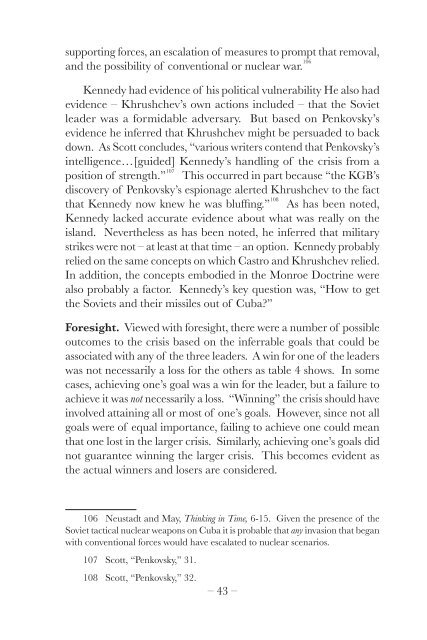Critical Thinking and Intelligence Analysis
Critical Thinking and Intelligence Analysis
Critical Thinking and Intelligence Analysis
Create successful ePaper yourself
Turn your PDF publications into a flip-book with our unique Google optimized e-Paper software.
supporting forces, an escalation of measures to prompt that removal,<br />
<strong>and</strong> the possibility of conventional or nuclear war. 106<br />
Kennedy had evidence of his political vulnerability He also had<br />
evidence – Khrushchev’s own actions included – that the Soviet<br />
leader was a formidable adversary. But based on Penkovsky’s<br />
evidence he inferred that Khrushchev might be persuaded to back<br />
down. As Scott concludes, “various writers contend that Penkovsky’s<br />
intelligence…[guided] Kennedy’s h<strong>and</strong>ling of the crisis from a<br />
position of strength.” 107<br />
This occurred in part because “the KGB’s<br />
discovery of Penkovsky’s espionage alerted Khrushchev to the fact<br />
that Kennedy now knew he was bluffing.” 108<br />
As has been noted,<br />
Kennedy lacked accurate evidence about what was really on the<br />
isl<strong>and</strong>. Nevertheless as has been noted, he inferred that military<br />
strikes were not – at least at that time – an option. Kennedy probably<br />
relied on the same concepts on which Castro <strong>and</strong> Khrushchev relied.<br />
In addition, the concepts embodied in the Monroe Doctrine were<br />
also probably a factor. Kennedy’s key question was, “How to get<br />
the Soviets <strong>and</strong> their missiles out of Cuba”<br />
Foresight. Viewed with foresight, there were a number of possible<br />
outcomes to the crisis based on the inferrable goals that could be<br />
associated with any of the three leaders. A win for one of the leaders<br />
was not necessarily a loss for the others as table 4 shows. In some<br />
cases, achieving one’s goal was a win for the leader, but a failure to<br />
achieve it was not necessarily a loss. “Winning” the crisis should have<br />
involved attaining all or most of one’s goals. However, since not all<br />
goals were of equal importance, failing to achieve one could mean<br />
that one lost in the larger crisis. Similarly, achieving one’s goals did<br />
not guarantee winning the larger crisis. This becomes evident as<br />
the actual winners <strong>and</strong> losers are considered.<br />
106 Neustadt <strong>and</strong> May, <strong>Thinking</strong> in Time, 6-15. Given the presence of the<br />
Soviet tactical nuclear weapons on Cuba it is probable that any invasion that began<br />
with conventional forces would have escalated to nuclear scenarios.<br />
107 Scott, “Penkovsky,” 31.<br />
108 Scott, “Penkovsky,” 32.<br />
– 43 –
















